On the 21st, Binance Launchpad launched the 47th project Portal. Users can obtain Portal token PORTAL rewards by staking BNB and FDUSD on the Launchpad website. The total PORTAL can Mining for 7 days. As of writing, according to Binance data, the PORTAL mining pool has pledged more than 8 billion US dollars in assets, of which the BNB mining pool has deposited more than 16 million BNB (approximately 6 billion US dollars); the FDUSD mining pool has deposited approximately 20 100 million FDUSD (approximately 2 billion U.S. dollars).
In the last bull market, Binance successfully "selected" the blockchain game Axie Infinity, which became popular in the middle of the bull market. In addition to successfully introducing the card game mechanism into the Web3 world In addition, the Ethereum side chain Ronin Network launched later has also become the infrastructure of choice for many current games. Binance’s last Launchpool project was also the social network game Pixels built on Ronin.
So what kind of project is the Portal selected this time?
What is Portal?
Portal is a Web3 game platform, and the platform’s native token is PORTAL. Portal aims to improve the user experience of Web3 game interconnection and become a link between Web3 games and game players. Not only can players log in and play in any Web3 game, but NFT game props in different games can also circulate with each other, even if they are not in the game. Games on the same chain can all be implemented.
Portal completed the token pre-sale on December 14 last year. In the first 15 minutes, the pre-sale raised nearly 10 million US dollars and generated a total of more than 520 Thousands of transaction requests. Demand for private tokens and pre-sale tokens has exceeded supply three times, but the total amount of the pre-sale has not been disclosed. According to a previously released white paper, by cooperating with LayerZero labs, it can connect games and game players on different blockchain networks, change the way mainstream audiences participate in Web3 games, and lower the threshold for players to play Web3 games.
Project background
⌜In the next four years, the game industry will Growth of nearly $100 billion. Portal puts Web3 at the heart of this growth cycle by connecting the best blockchain games with mainstream audiences⌟
Portal is the answer to Web3 A key issue for gaming: game distribution. Through LayerZero's technical support and cooperation with the Binance ecosystem, it provides a user-friendly gaming platform for users of the entire blockchain ecosystem, which not only attracts Web3 players on different chains but also links more game players from Web2.
Portal also issued Portal Passport, which can interact on different chains and integrate digital assets of game players. Portal uses LayerZero's full-chain protocol to realize digital assets. Quickly and securely cross-chain, which greatly improves the liquidity of game assets including NFTs and game tokens, which means that it can attract players on different chains and improve the playability of the game.
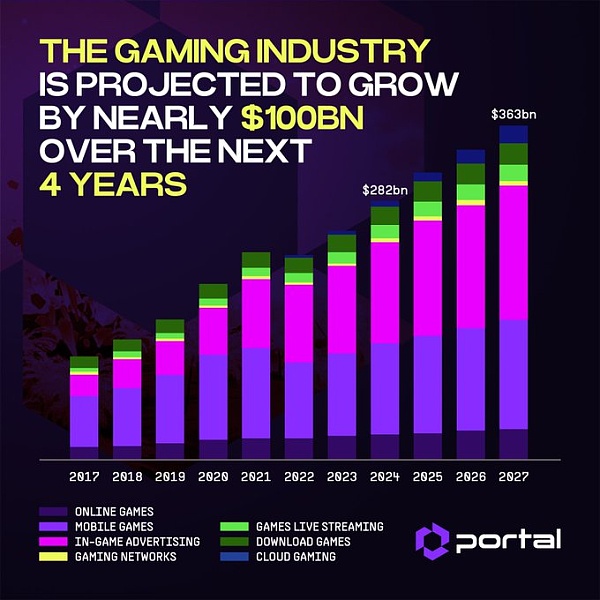
Project Team
According to information disclosed by Portal in recent days, members of the Portal Advisory Board include:
John Yao: CEO of e-sports club Team Secret. John Yao will provide insights and resources into the mainstream esports scene. Team Secret is a European professional team founded in August 2014. It mainly participates in competitive projects such as "League of Legends" and "DOTA 2".
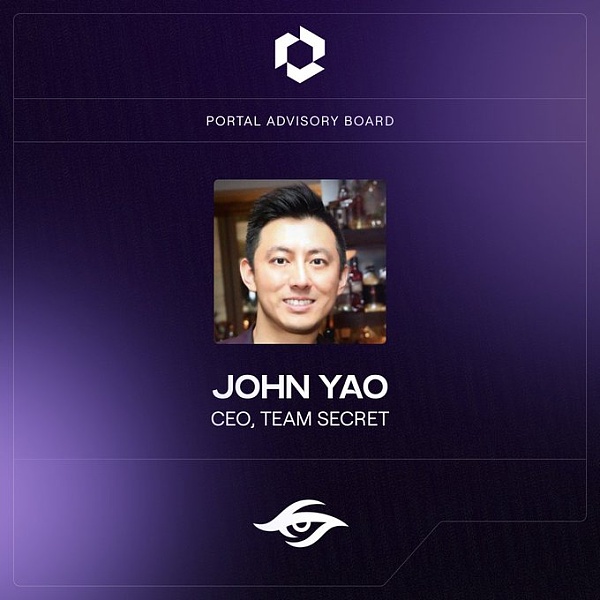
Jamie King: Co-founder of Rockstar Games. Rockstar Games is the game development branch of Take-Two Interactive. It was established in 1998. The company's works are most famous for the "Grand Theft Auto" series.
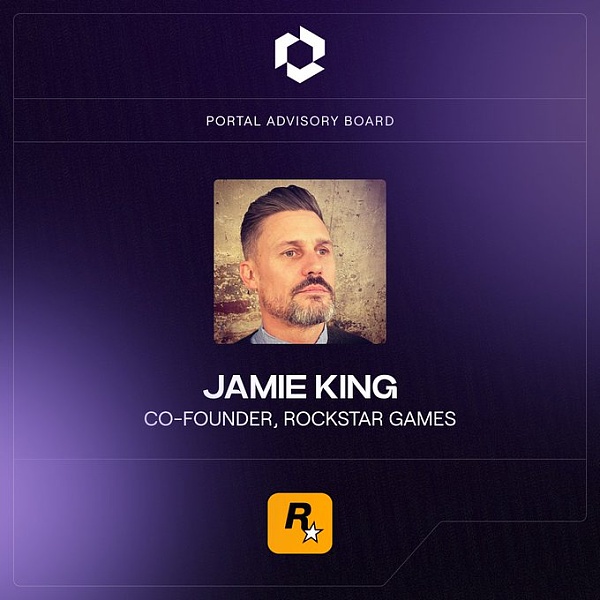
However, according to Jamie King's LinkedIn work history, he resigned from Rockstar Games in 2006. According to GAMERANT , Jamie King is parting ways with Rockstar Games due to differences between the game's producers over the direction of development following the success of Grand Theft Auto. Jamie King's primary responsibility at Portal is to drive the inclusion and linkage of Web2 games, as well as provide advice on game and IP creative and direction strategies.
Russell Hanson: served as chief scientific officer of the Consensys Endjinn AI team from 2018 to 2019, responsible for developing and improving cryptocurrency Artificial intelligence model. Russell Hanson will bring generative AI + automation to Portal and its growing library of games and digital assets.
Matt Dixon: worked at Electronic Arts from October 2016 to August 2022 (Electronic Arts) Business Development Director.
Portal Gaming’s strategic investors include Newman Group, which will provide Portal Gaming’s Asia strategy Give suggestion. Gaming partners include Space Nation, Oxya Origin, Nine Chronicles, Crypto Unicorns, MagicCraft, DeFi Kingdoms, and more. Other partners include LayerZero, Magic Eden, M80 (esports and gaming organization) and MWE (entertainment and culture organization).
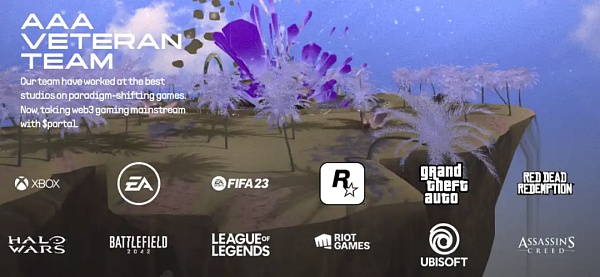
Project Economic Model
PORTAL's maximum supply is 1 billion, which will be minted at the beginning of the mainnet launch , and then released to the community treasury over time. The main uses of tokens are as follows:
Transaction: Users can use PORTAL to purchase game items and other game products in online games.
Cross-chain fee token: Users can use PORTAL to pay cross-chain transaction fees.
Staking: Users can stake through Launchpad to obtain newly issued game tokens and NFTs.
Node: Users can purchase PORTAL nodes to assist the network in verification.
Network consensus: Users can stake PORTAL into nodes and become Portal network node validators.
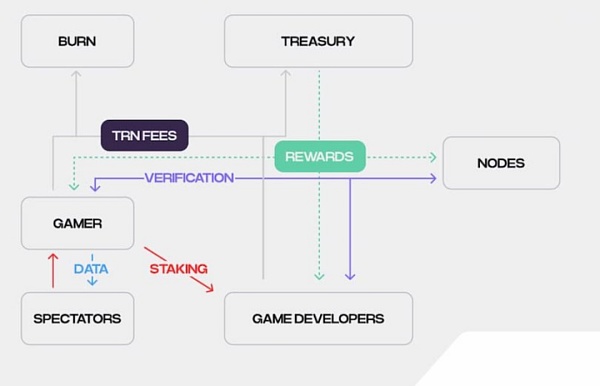
Project Economic Model Diagram
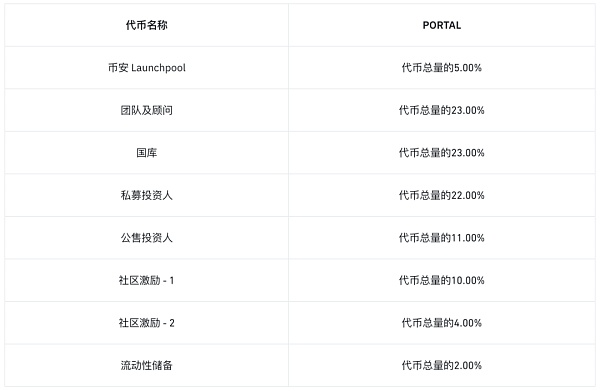
Token Allocation
Portol 2024 Roadmap
Q1 2024:
PORTAL TGE: Launch PORTAL tokens on the leading CEX and go online on the Ethereum mainnet.
Web2 game linkage: First major Web2 game linkage for eSports + digital collectibles.
Foundation: Launch the Portal Foundation and continue efforts to achieve decentralized governance of the Portal platform and ecosystem.
Portal Staking: Launch ⌜Stake-To-Access⌟ and stake PORTAL to earn points for use within the Portal Launchpad.
Portal node: Launch the portal node network and allow PORTAL holders to become validators within the portal network.
Discovery Platform: Launching the Portal Discovery Platform, showcasing the best Web3 games in the Portal ecosystem.
Launchpad: Web3 game projects can issue game tokens through the Portal platform, allowing PORTAL holders to obtain the latest updates from the Portal network GameFi Tokens and NFTs.
Second Quarter 2024:
Game Wallet: Launching portal game wallet and game SDK for easy integration. The wallet is an MPC wallet with ⌜Web2 Auth⌟ capability for seamless access.
Marketplace SDK: Launched the portal market SDK for cross-chain asset transactions.
Second quarter Web2 game linkage: Web2 IP linkage of e-sports + digital collectibles.
Second quarter cross-chain expansion: Expand PORTAL and game platform to new chains.
Third Quarter 2024:
NEXUS (DEX): Launching Portals cross-chain liquidity game exchange to achieve seamless asset-to-asset trading
Web2 game linkage in the third quarter: Web2 IP linkage of e-sports + digital collectibles.
Cross-chain expansion in the third quarter: Expand PORTAL and game platform to new chains.
Q4 2024:
Conclusion
Portal's narrative has made a large number of entertainment game users look forward to it. If it is successfully realized according to its preset path, it will definitely become a masterpiece in the field of Web3 and games. As Potal continues to develop and grow, I believe it will bring more opportunities and value to users, while contributing to the development of the entire cryptocurrency ecosystem. However, it remains to be seen whether it can implement Potal wallet tokenization by integrating game assets on different chains. After all, users are concerned about the long-term value of currency prices.
 JinseFinance
JinseFinance
 JinseFinance
JinseFinance JinseFinance
JinseFinance JinseFinance
JinseFinance JinseFinance
JinseFinance Brian
Brian JinseFinance
JinseFinance Sanya
Sanya Max Ng
Max Ng Cointelegraph
Cointelegraph Cointelegraph
Cointelegraph